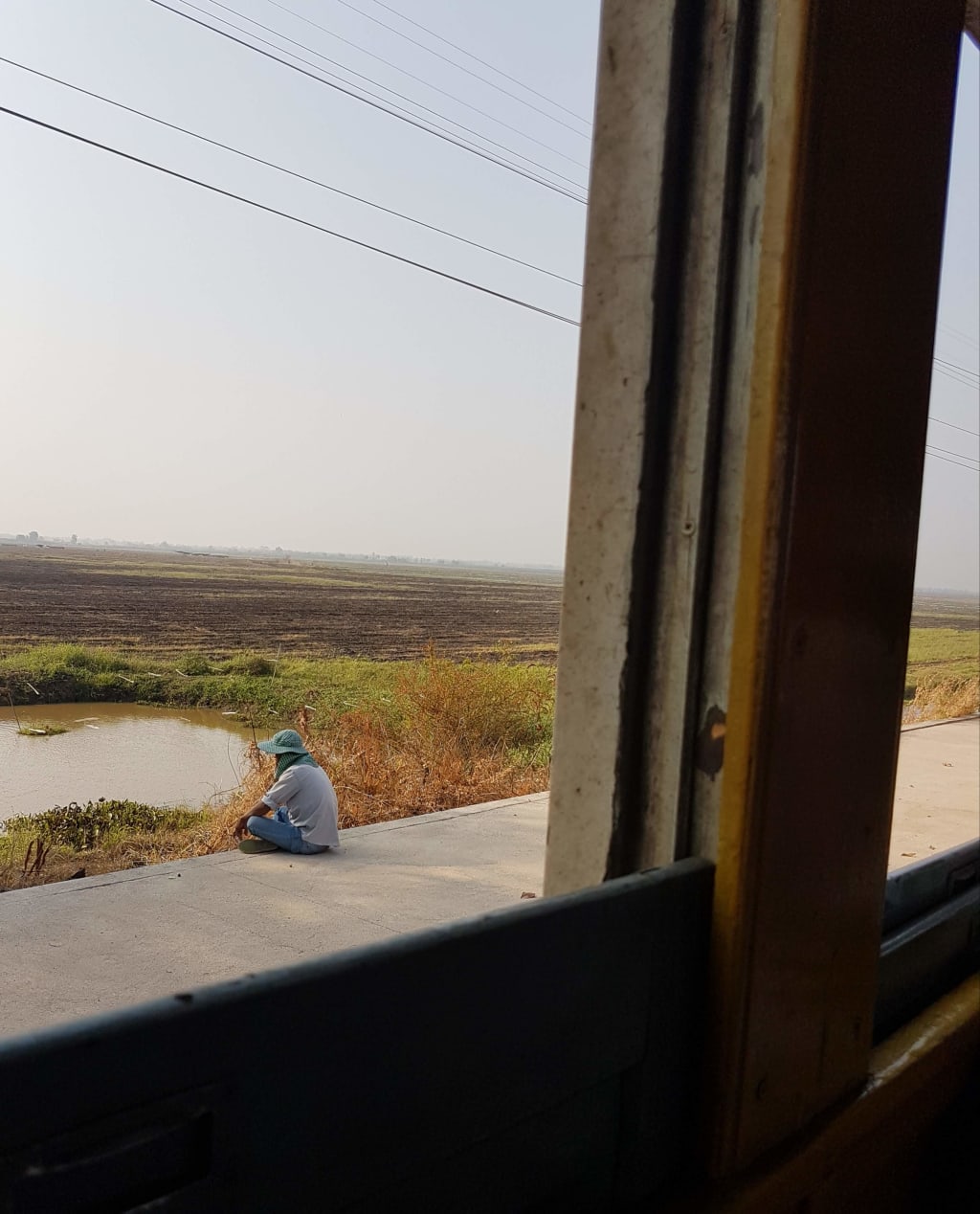Riding the Rails from Thailand to Cambodia
A memorable 6-hour journey in 2019

Note: This is the first short essay of a series of travel tales from when I was lucky enough to see many places (pre-pandemic). Come back for more soon!
We're all still waiting out this pandemic, but the continued distribution of the COVID-19 vaccine by many hardworking folks gives me hope that soon I'll be able to dust off my suitcase and travel again. Until that happens, I want to devote a few short pieces here on Vocal to the many adventures I was lucky enough to take over roughly a decade. Please enjoy this one.
On my last morning in Bangkok, I ordered a taxi at 4:30 AM. It was late January 2019, but already the humidity swelled from the sidewalk. I was grateful to be able to spend my first Chinese New Year holiday from teaching English in Beijing in the perpetually warm, tropical climate of southeast Asia. I'd just spent three wonderful nights in Bangkok, Thailand's bustling capital, and was about to journey by train from the city to Thailand's southern border with Cambodia, a country I'd not yet seen. I was going to travel the length of Cambodia over the next several days, stopping first for a couple of nights in Siem Reap and then continuing to journey south to meet old friends in Kampot. They'd urged me to try this six-hour train ride from Bangkok to Poipet, Cambodia's northernmost border town. I was a little nervous about doing such a long trip alone, but they assured me it was safe.
"Just watch out for the fake border agents. Your tuk-tuk driver at the train station will likely take you to them first. They all work together to try to take tourists' money."
"Fake border agents?" I asked, alarmed. I didn't even consider that such a thing could happen, but I was used to occupying much larger spaces. Cambodia is a small country that is still recovering from the terrible genocide only a generation ago, so there is room for such things to happen.
"You'll be fine," my friends said. "Think of it as a great adventure!"
When the taxi driver dropped me off at Bangkok's train station, already bustling with activity, I strained to lift my heavy backpack, which was stuffed with clothes, a couple of books, and enough food and water to last the duration of the trip. I had never packed so efficiently, but still I strained under my possessions.
I forgot about how heavy my backpack was when I entered the station. Built in the early 20th century, it is a massive gorgeous relic of Renaissance Revival architecture. Though it's visibly old and a little run-down, the arches and gleaming tile floors were so well built that it's still impressive to behold. I walked up to the counter for reserved tickets and paid for mine. It was only slightly over one U.S. dollar.
There were no assigned seats on this train, so I quickly boarded and found a small bench seat facing a window. It was big enough for one American and her large backpack or two smaller passengers. Though I was prepared to share my seat with someone if they needed it, no one asked. I think I was the only foreigner on the train that morning.
Shortly after I boarded, the train cranked into life. We made a pleasantly slow exit from the outskirts of Bangkok. It was still dark outside, but I could see people getting ready to start their day from the yellow light of their apartment windows. Laundry hung on clotheslines, and middle-aged men with potbellies smoked near their scooters, watching the old train and its passengers go by. More people got on at various other stops before we completely left the city. Still, no one made a gesture to sit by me.
By the time the sun rose, we were well out of Bangkok. I drank some water and ate some snacks I'd picked up at the Seven-Eleven next to my Airbnb and settled into my green bench seat. I could tell my rear would be completely numb after sitting in it for six hours, but I decided early in the trip that I wasn't going to move, not even to use the bathroom, unless it was absolutely necessary. I was alone; there was no one else to hold my seat. I thought of one of my favorite memoirs, Blood, Bones, and Butter, in which chef Gabrielle Hamilton writes of her travels as a young person in India. She would convince herself to stay put in a train seat for hours, just to ensure she could simultaneously sleep and travel in safety. If Hamilton could do it, so could I.
I have never experienced the passing of time in such a way, and I doubt I ever will again. Six hours is of course a long time, but it doesn't seem quite so long in a train--especially an old train that is itself a functioning time capsule. We click-clacked with the windows wide open. There was no air conditioning. It did get incredibly hot near the middle of the day, but the heat with the warm breeze had a soothing rather than oppressive effect. I slept for hours, lulled by the gentle rocking and the sun holding my face.
I watched people get off at various stops through the Thai countryside. They became gradually more rural until there simply were no train stations, just carved out paths in the lush wilderness. I wondered what kind of villages the men and women were walking toward as we again picked up speed and rolled away.
At one point, a man got on from one of these rural stops with a baby. They sat across from me. He looked old enough to be the baby's grandfather, but it was hard to tell his exact age. His skin was weathered from sun and what was surely hours and hours of hard physical labor. He looked tired, but when he looked down at the baby boy in his arms, his face broke into the most beautiful smile I'd ever seen. The baby cooed up at him, his skin miraculously smooth and soft in comparison to the man's. I thought about them for most of the trip, even after they got off at a stop not far down the road.
When we finally reach the last stop, the station just outside the border, it was nearly noon. I was amazed to discover my legs still worked; my entire bottom half had been completely numb for the last hour or two. When I exited the train, my backpack once again straining against my shoulders, I found several tuk tuk drivers ready and waiting to take many passengers to the border station. I picked the one that looked friendliest and gave him a crisp five-dollar bill--the preferred currency in this place. He revved up his tiny motor, and we sped down a dusty road. Five minutes later, we were back in civilization. He dropped me off at a small wooden building that didn't look official enough to be the border office.
"Here?" I asked the man. "Border?"
"Border," he repeated, smiling. I knew this wasn't right but lacked the language or the patience to negotiate. He sped off, and I was swarmed by several young men wearing official-looking badges. They even had paperwork for me to sign.
"Where are you from? Canada?" one asked. I smiled at this, surprised that he'd first assume I was Canadian.
In my hazy post-ride state, it took me a couple of minutes to realize this office was a fake like my friends had warned me about.
"Where is your passport?" another asked. Oh no.
"This is not right," I said slowly, looking at the convincing but obviously fake tourist visa application forms they'd handed me. "I need the border to Cambodia."
"This is the border, Miss," the first said to me. He flashed a reassuring smile.
"No," I said, shaking my head.
"Please, just give us your passport--"
"NO," I said again, more forcefully this time. I put down the paperwork and hiked up my backpack. When they realized I was leaving, they scattered as if I didn't exist. All the more proof this was a scam arrangement.
I walked about another block and saw the very obvious sign for the real border office. There was a public toilet nearby. A sign in English said it cost some Cambodian currency, which I did not yet have. The woman watching over the toilet took one look at me and nodded. I could go inside. I wondered why she let me, and then I saw myself in the mirror and laughed. I looked exactly like someone who had been on a train with open windows for six hours. My hair was fanned out like a lion's mane. No wonder the fake border agents let me go so easily.
After cleaning myself up a bit, I walked to the real border office and followed the English instructions printed on the wall for filling out the paperwork. I submitted my passport, a headshot photo, some U.S. currency, and my completed application to an agent, who gave it to another agent behind a window. There weren't many people in line ahead of me. After about ten minutes, the window-agent called my name. He did a double-take when he saw me; I'm guessing it was unusual to see a single white woman in her early 30s traveling alone.
"Where is your...boyfriend?" he asked in English. He stared at my naked left hand.
I paused at this. I was five months into living abroad in China, less than a year divorced, and had just successfully warded off some fake border agents. This was one of the most independent moments of my life. I did technically have a boyfriend back in the U.S., but what had blossomed as a summer romance before my big move to Asia was already fading. I'd invited him to see Cambodia with me. He'd bought a third car instead. I would call him less than a month later and break up. There were more adventures ahead of me.
"Too far away," I said with a smile. He shrugged and stamped my passport. I could go. I crossed the border from Thailand into Cambodia on my own two feet, feeling absolutely free.
Note: This wonderful travel blog was very helpful for this particular journey: https://www.seat61.com/Cambodia.htm
Thank you for reading this travel story. If you enjoyed it, please consider making a small donation or reading any of my other pieces on Vocal so far, including my short story "Epilogue," which is also loosely based on my world travels.
About the Creator
Jenny Rowe
Jenny Rowe lives in Iowa City and teaches ESL to students both here and abroad (remotely). She was teaching English in Beijing before the global pandemic. Her work has appeared both locally and overseas in Beijing's Spittoon Collective.






Comments
There are no comments for this story
Be the first to respond and start the conversation.